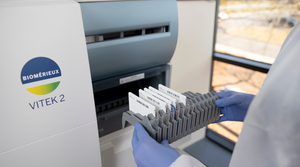Apple's Latest Acquisition Could Be Medtech Game Changer
November 25, 2013
Recently acquired 3-D sensing technology could make computing giant Apple an even more disruptive force when it comes to healthcare technology.
Purchased by Apple for a reported $350 million, PrimeSense has technology that can capture the nuances of a 3-D environment, and is so accurate that it can detect the pulse of people positioned in front of it.
The motion sensor company is best known for its work with Microsoft in developing the Kinect system, which enables users to control the gaming system using body movement.
PrimeSense serves a number of markets with its 3-D sensing technologies, ranging from healthcare to gaming to robotics. This technology could be used for health-related applications, and it could determine how interested someone is in a game or TV show--basically Nielsen ratings where those surveyed could never fib.
The functionality works by coding an environment with near-infrared light and scanning the data with a CMOS image sensor, which analyzes the light reflecting back from the environment. Computational algorithms help decode the light patterns.
In the industrial realm, the company's 3-D sensing technology enables the use of robotics in dynamic production lines where it can be used to precisely classify items placed before it. The technology could be harnessed to automate assembly tasks that are still performed manually. In addition, the technology can also be implemented in industrial environments to identify safety problems, triggering alerts before they lead to injury.
The platform also can be applied in a computing desktop environment to give users touchless control of software by waving their hands through the air. Known as the 3Gear SDK, the software enables finger-precise hand gestures and subtle wrist movements to be used to control software. Users can, for instance, making a pinching gesture in the air to zoom in on something.
See the Apple iPhone 5s and iPhone 5c taken apart and their components explored at BIOMEDevice in San Jose, CA, December 3-5. |
In medicine, the technology could be used to improve hygiene by preventing clinicians from touching equipment after touching infected patients. Surgeons with bloody gloves could continue to operate software without the need to touch computer interfaces. The sensors could be integrated into devices for monitoring the elderly, to help monitor rehabilitation, and movement disorders such as Parkinson's.
The technology has been integrated into a remote telepresence robot named RP-VITA that enables doctors to care for patients remotely. Roughly 1000 telepresence robots have been purchased by hospitals in the United Sates, including about 50 RP-VITA devices, which made their debut in May 2013.
The technology acquisition is one of the most significant by Apple since the computing giant purchased Siri from Stanford Research Institute in 2010.
Speaking on that point, Forbes' Shel Israel muses
The only caution I feel about this deal is based on Apple's acquisition history. It has purchased other technologies and then botched the acquired company's assets. Siri, comes to mind. [...] The company then seemingly invested more into a glitzy ad campaign than in evolving the technology-which has since been passed by rival Google.
If, however, PrimeSense's technology continues to catch on, it could ultimately be bigger than Siri, helping spur a range of applications that benefit medical technology.
Speaking at TCT in 2011, inventor David Albert, MD quipped that things would get interesting in medicine when Siri meets IBM's Watson. "When a physician can take Epocrates and Siri--be hands free--and combine that with the global power of Watson, you see those kind of tools come together and you say 'amazing!'" he says. "You will have amazing things." For instance, somebody in Africa can get a diagnosis by a physician in the United States. Or a dermatologist could look at a patient's mole remotely and determine whether it is melanoma or not," he said.
And things will be even more interesting if PrimeSense can give vision to both Watson and Siri, clearing the way for significant advances in medical technology.
Brian Buntz is the editor-in-chief of MPMN. Follow him on Twitter at @brian_buntz and Google+.
About the Author(s)
You May Also Like

